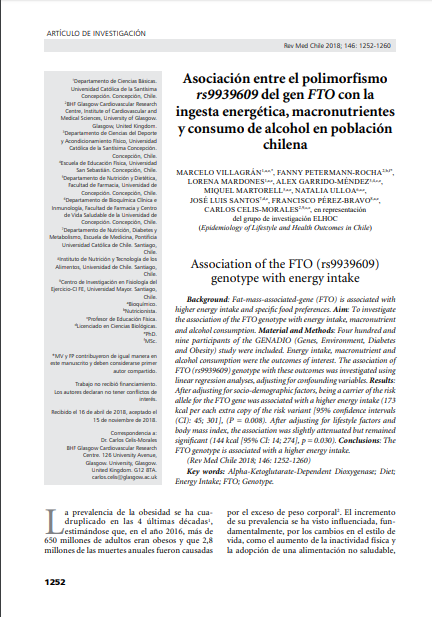Association of the FTO (rs9939609) genotype with energy intake

Fecha
2018Autor
Celis-Morales, Carlos A. [Univ Mayor, CIFE, Santiago, Chile]
Villagran, Marcelo
Petermann-Rocha, Fanny
Mardones, Lorena
Garrido-Méndez, Alex
Martorell, Miquel
Ulloa, Natalia
Santos, José Luis
Pérez-Bravo, Francisco
Ubicación geográfica
Notas
HERRAMIENTAS
Resumen
Background: Fat-mass-associated-gene (FTO) is associated with higher energy intake and specific food preferences. Aim: To investigate the association of the FTO genotype with energy intake, macronutrient and alcohol consumption. Material and Methods: Four hundred and nine participants of the GENADIO (Genes, Environment, Diabetes and Obesity) study were included. Energy intake, macronutrient and alcohol consumption were the outcomes of interest. The association of FTO (rs9939609) genotype with these outcomes was investigated using linear regression analyses, adjusting for confounding variables. Results: After adjusting for socio-demographic factors, being a carrier of the risk allele for the FTO gene was associated with a higher energy intake (173 kcal per each extra copy of the risk variant [95% confidence intervals (CI): 45; 301], (P = 0.008). After adjusting for lifestyle factors and body mass index, the association was slightly attenuated but remained significant (144 kcal [95% CI: 14; 274], p = 0.030). Conclusions: The FTO genotype is associated with a higher energy intake.
URI
https://doi.org/10.4067/S0034-98872018001101252http://repositorio.umayor.cl/xmlui/handle/sibum/6212
Coleccion/es a la/s que pertenece:
Si usted es autor(a) de este documento y NO desea que su publicación tenga acceso público en este repositorio, por favor complete el formulario aquí.